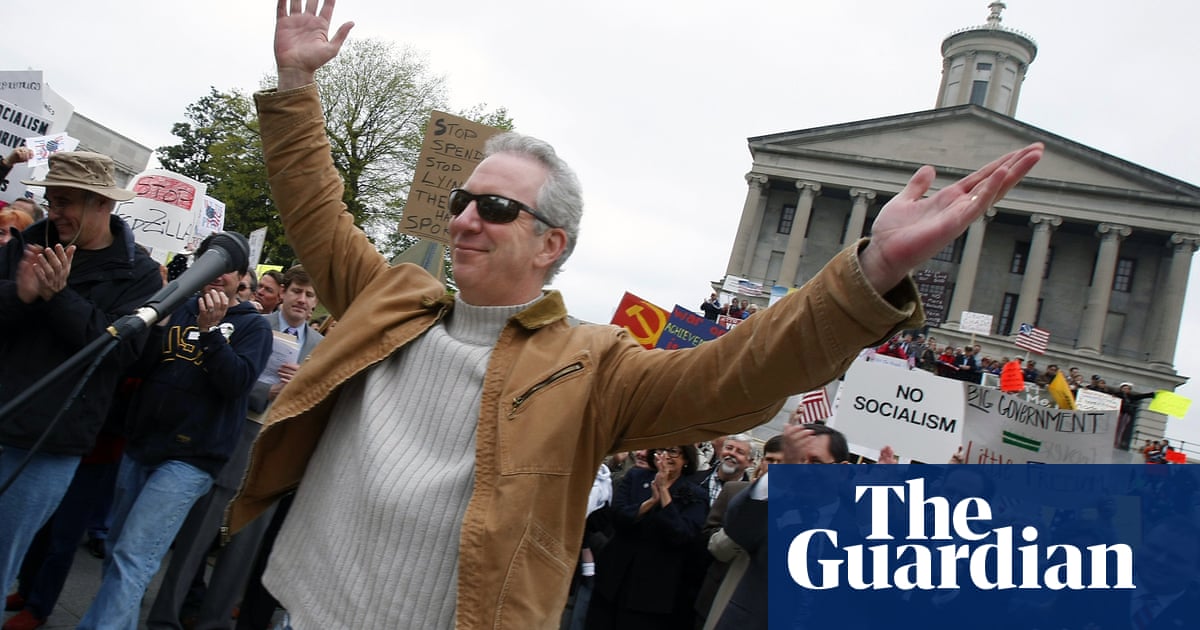Dangerous transmissions: anti-vax radio shows reach millions in US while stars die of Covid

Phil Valentine, a prominent Tennessee rightwing talk radio host, had released a song called Vaxman, an anti-Covid vaccination ditty based on the Beatles track Taxman.
Marc Bernier, a host in Daytona Beach, Florida, had declared himself “Mr Anti-Vax”. Dick Farrel, also from Florida, urged his listeners not to get vaccinated, and Jimmy DeYoung asked on air whether the vaccine could be a “form of government control of the people”.
All four men died in August of coronavirus. A fifth conservative radio host, Bob Enyart, died on 13 September, weeks after he told his listeners to boycott vaccines that were “immorally developed”.
The death of the men, just weeks apart, illustrated both the depth of anti-vaccine feeling among some conservatives, but also hinted at the problems rightwing talk radio, along with other conservative media, is causing as vaccination rates in the US have slowed.
Local talk radio is not often mentioned in discussions about conservative media and messaging in America.
Fox News and even more extreme rightwing television channels like Newsmax and One America News draw the headlines, and Facebook is often noted as a source for conspiracy theories, but behind the scenes thousands of small radio stations make up a patchwork of conservative media across the US that is enjoyed by millions.
In terms of the spread of misinformation, talk radio’s impact is unappreciated, Angelo Carusone, president of Media Matters, a progressive media watchdog, said.
“It is clearly a driving force. A lot of people understandably focus on online, especially when it comes to anti-vax information. But the reality of it is, when the dust settles, I think what we’re going to find is that the real source of a lot of the most damaging anti-vax messaging was driven largely by traditional media: talk radio and traditional rightwing forces like Fox News,” he said.
“When we think about talk radio, the reason it has had such influence is the reach. It still is reaching the largest number of people. Fox [News] is going to reach a couple of million people a day. Talk radio is reaching 40 million, 60 million people depending on the day, maybe even more.
“The guys who are dying, you could treat them as [having] small radio shows, but they have really high concentration in their communities.”
These radio hosts can be even more outspoken than their equivalents on Fox News. Personalities on the rightwing TV network tend to be careful about how they address vaccine opposition, urging viewers to “speak to a doctor” and make their own decisions before getting vaccinated, rather than telling people outright to avoid the shots.
There is less direct anti-vax messaging on Fox News, but a recent report by Media Matters still found that 60% of the network’s vaccination coverage “included claims undermining or downplaying vaccinations”.
Those claims and the network’s output leave Fox News open to suggestions of hypocrisy: this week it was revealed that the vast majority of employees at Fox Corporation, which includes Fox News, are vaccinated, and those who are not have to undertake daily Covid tests to continue to work.
A Fox News spokesperson pointed the Guardian to a Washington Post study which found that people who got their news from Facebook were less likely to be vaccinated than those who got their news from Fox News. The same study found that Fox News viewers were less likely to be vaccinated than the general population.
On rightwing talk radio stations across the country, hosts stick to their guns – as the recent deaths indicate.
“Talk radio has always bashed elites and the mainstream media, and I think it is an extension of that to be questioning the public health professionals who are the ones handing down, seemingly from on high, these ever changing public health edicts tied to masks and vaccines and other things,” said Brian Rosenwald, a scholar-in-residence at the University of Pennsylvania and author of Talk Radio’s America: How an Industry Took Over a Political Party That Took Over the United States.
While radio hosts might be the public voice of that skepticism, it is a common misconception that audiences are “puppets”, Rosenwald said. Instead, it’s radio hosts who might find themselves “entrapped by what the audience wants to hear”.
At the beginning of the pandemic, many rightwing talk radio hosts were publicly skeptical, and, not wishing to lose listeners, and with them advertisers, they had backed themselves into a corner.
“There was a lot of: ‘Come on, this is no worse than the flu, are we really shutting down over the virus.’ There was a lot of: ‘Who the hell are these people to be shutting down the world,’” Rosenwald said.
“Now flash forward: if you’ve started off there in March 2020, when you factor in the general culture to begin with, skeptical of elites, it really doesn’t leave you a lot of room to then reverse course when we get to the point that there are vaccines.
“There’s no easy moment to say: ‘Look, I know I’ve questioned the public health professionals, I’ve questioned the whole thing, but you should listen to them now, go get vaccinated.’ To some extent the genie is out of the bottle at that point.”
For a radio station to acquire a broadcast license, it has to promise two things, Carusone said. One, not to overpower your antenna, and two: “Promise that you are fit and proper, that you fit at minimum the basic tenets of getting a license to broadcast.” But the latter is often little-policed, Carusone said.
“At minimum I think it’s a little bit insane that we’ve allowed the whole process about getting a broadcast license to become so pro-forma that it doesn’t matter if your radio hosts are out there dying from their own misinformation,” he said.
“From a regulatory perspective it would be great if there were some rules around this, but at minimum I feel like we already have an avenue, which is if the FCC just treated this as part of the standard license requirement it would help – by telling [talk radio hosts]: ‘At minimum you should be careful what you say.’
“They think they can get away with murder. And in this case, not even metaphorically any more.”
At least two of the five radio hosts who died had a change of heart as they became seriously ill.
In late July, after Valentine had been hospitalized from Covid-19, his brother Mark Valentine appeared on Nashville’s WWTN-FM himself.
“For those listening, I know if he were able to tell you this, he would tell you: ‘Go get vaccinated. Quit worrying about the politics. Quit worrying about all the conspiracy theories,’” Mark Valentine said. His brother died on 21 August.
Farrel, who died on 4 August, also changed his mind, his friend Amy Leigh Hair told the Washington Post.
“When he got very sick, he texted me and said: ‘This pandemic ain’t no joke. Get the shot,’” Hair said.
“He definitely admitted he hadn’t taken it seriously. At the end of the day, he was sorry about that.”


